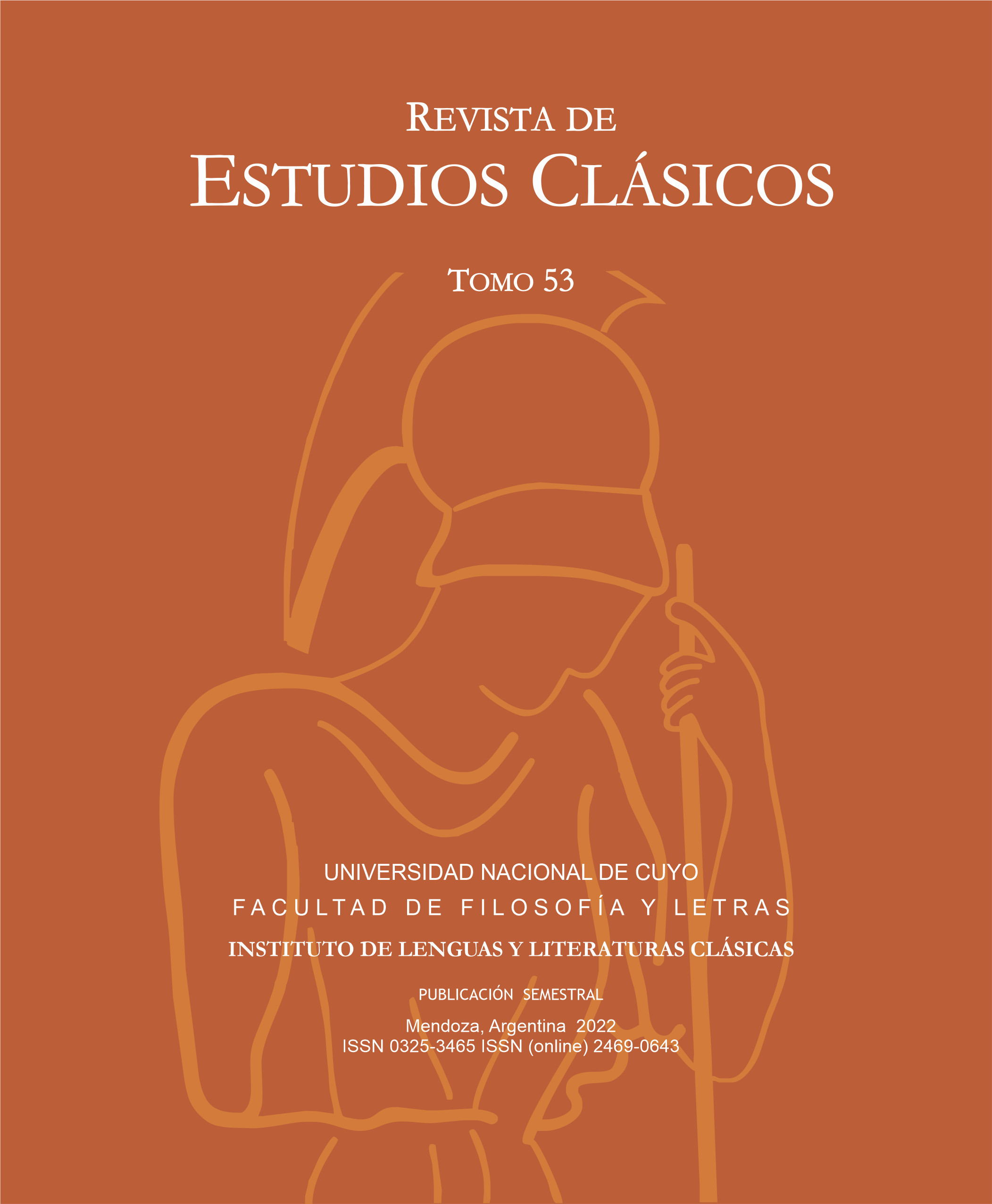The Passion of Oedipus
The Confinement and the Force of the Irrational in Euripides
Keywords:
Euripides, irrational, Oedipus, passions, reclusionAbstract
In the last Euripidean play to be performed while the poet was still alive, Oedipus is presented locked up for almost the entire tragic action, prey to an irrational anguish that corrodes him and must finally be atoned for by the traditional exile. This paper seeks to explain the use of confinement in this play, Phoenissae, in order to unravel its significance in the light of epic accounts and Attic drama on the premise that Euripides retains a deliberate and committed interest in the mystery of the passions and their irrational nature.
References
Bauzá, H. F. (2011). “Edipo: entre historia y mito”. Buenos Aires: Academia Nacional de Ciencias de Buenos Aires. Recuperado de: https://ciencias.org.ar/user/Edipo.%20Entre%20historia%20y%20mito%20(1).pdf
Dodds, E. R. (1929). Euripides the Irrationalist. The Classical Review, 43(3), pp. 97-104.
Filócomo, C. (2021). Héroes al margen. La locura masculina en las tragedias de Eurípides. Buenos Aires: Ed. UNS.
Foucault, M. (2009). El gobierno de sí y de los otros. Trad. de H. Pons. Buenos Aires: FCE.
Girard, R. (1972). La violence et le sacré. Paris: Bernard Grasset.
Goldhill, S. (1997). The Language of Tragedy: Rhetoric and Communication. En P. E. Easterling. (Ed.), The Cambridge Companion to Greek
Tragedy (pp. 127-150). Cambridge: Cambridge University Press.
Haslam, M. H. (1976). Interpolations in the Phoenissae: Papyrus Evidence. The Classical Quarterly. New Series. (nº 1), pp. 4-10.
Nietzsche, F. (2011). Obras completas I: Escritos de juventud. Trad. de D. Sánchez Meca et al. Madrid: Tecnos.
Nilsson, M. P. (1972). The Mycenaean Origin of Greek Mythology. Berkeley: University of California Press.
Parker, R. (1983). Miasma: Pollution and Purification in Early Greek Religion. Oxford: Oxford University Press.
Perczyk, C. J. (2015). El ritual y la locura en Heracles de Eurípides. Phoînix, 21(2), pp. 41-58.
Perczyk, C. J. (2018). La locura en Bacantes y Heracles de Eurípides. Buenos Aires: Miño y Dávila.
Propp, V. (1980). Edipo a la luz del folklore. Cuatro estudios de etnografía histórico-estructural. Trad. de C. Caro López. Madrid: Fundamentos.
Sánchez Ruipérez, M. (2006). El mito de Edipo. Madrid: Alianza.
Vernant, J-P. y Vidal-Naquet, P. (1986). Mythe et tragédie en Grèce ancienne - II. Paris: La Découverte.
Verrall, A. W. (1895). Euripides the Rationalist. A Study in the History of Art and Religion. Cambridge: Cambridge University Press.
Downloads
Published
How to Cite
Issue
Section
License
Copyright (c) 2023 AutorAquellos autores/as que tengan publicaciones con esta revista, aceptan los términos siguientes:
- Los autores/as conservarán sus derechos de autor y garantizarán a la revista el derecho de primera publicación de su obra, el cuál estará simultáneamente sujeto a laLicencia Creative Commons Atribución-NoComercial-CompartirIgual 2.5 Argentina (CC BY-NC-SA 2.5 AR). (https://creativecommons.org/licenses/by-nc-sa/2.5/ar/)que permite a terceros compartir la obra siempre que se indique su autor y su primera publicación esta revista.
- Los autores/as podrán adoptar otros acuerdos de licencia no exclusiva de distribución de la versión de la obra publicada (p. ej.: depositarla en un archivo telemático institucional o publicarla en un volumen monográfico) siempre que se indique la publicación inicial en esta revista.
- Se permite y recomienda a los autores/as difundir su obra a través de Internet (p. ej.: en archivos telemáticos institucionales o en su página web) antes y durante el proceso de envío, lo cual puede producir intercambios interesantes y aumentar las citas de la obra publicada. (Véase El efecto del acceso abierto).












